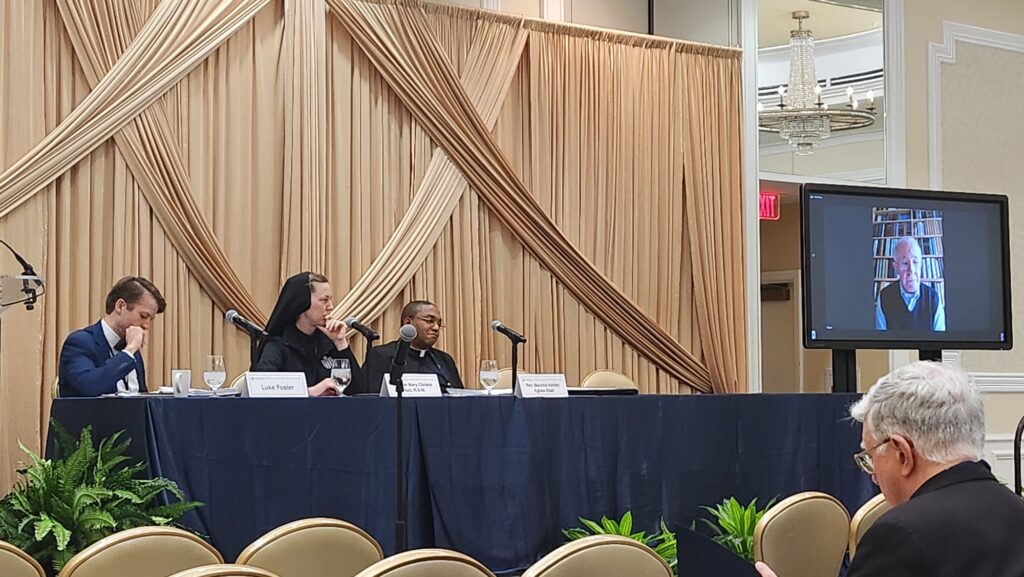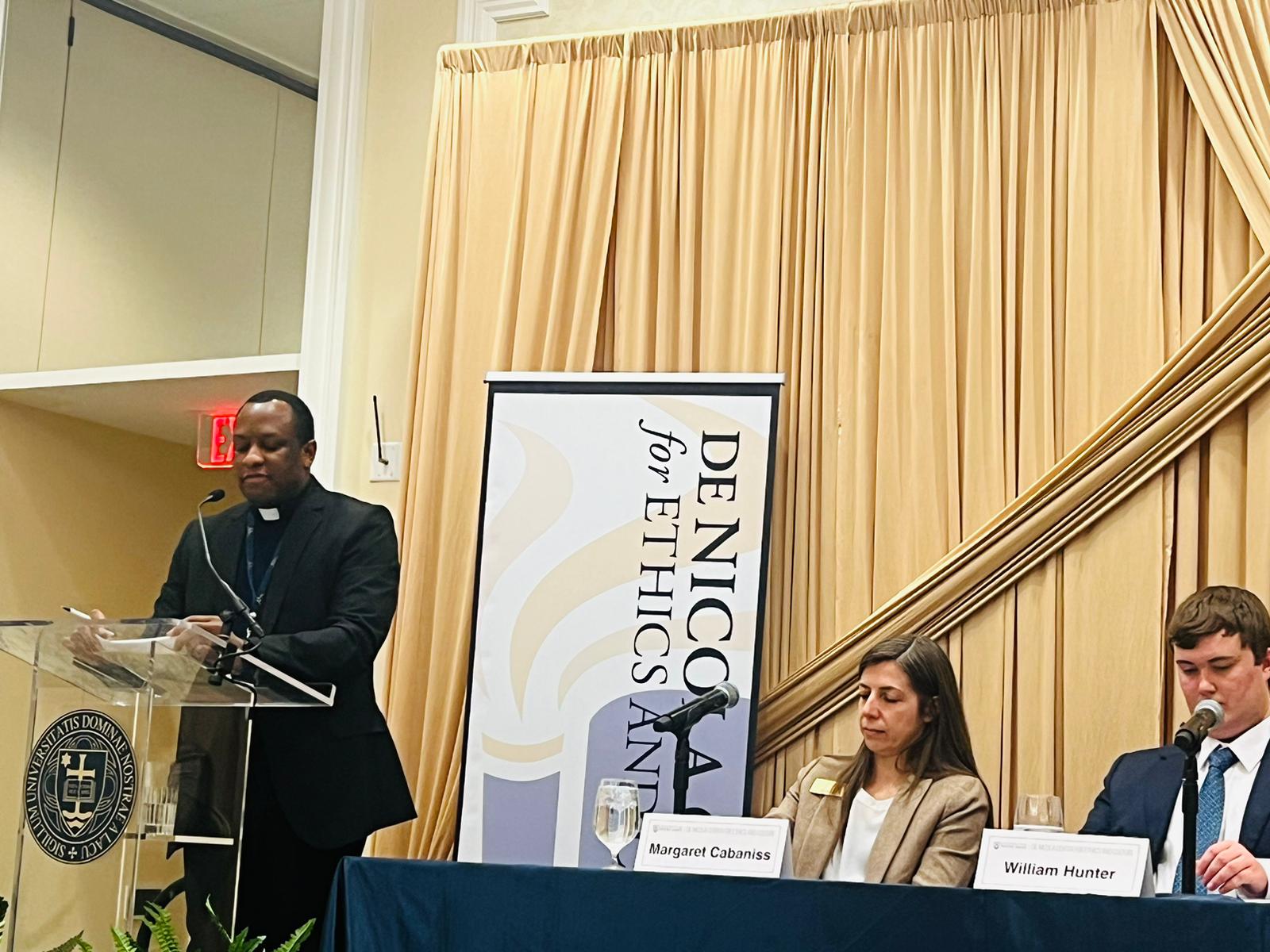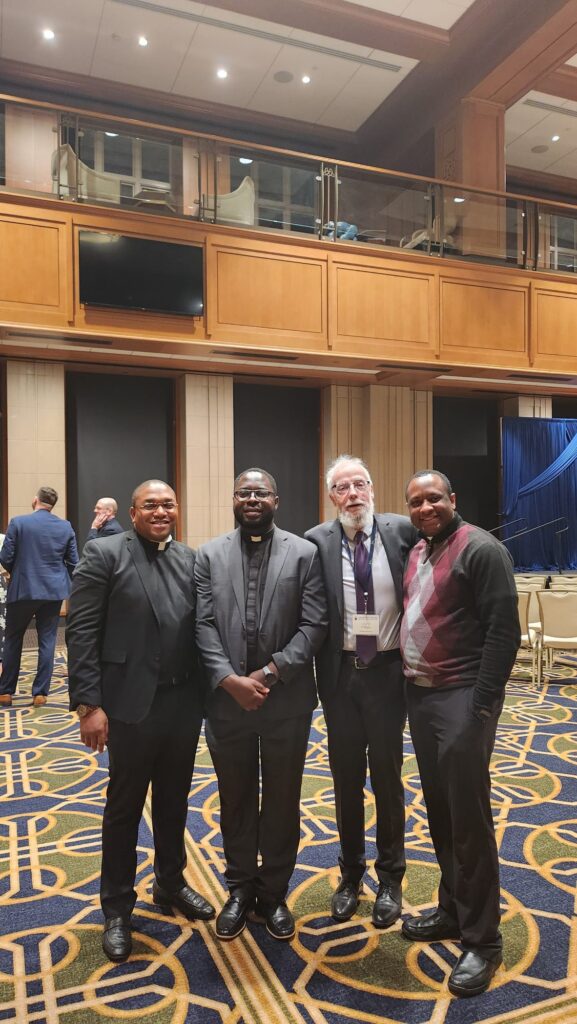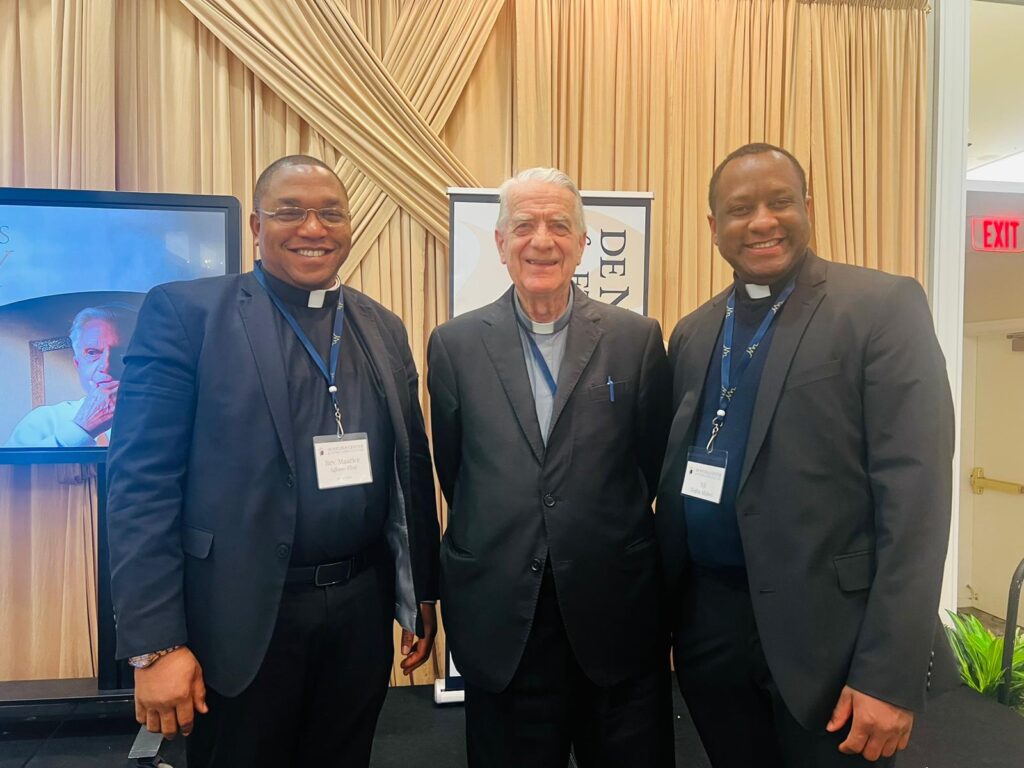Highlights from the International Conference on “Benedict XVI’s Legacy: Unfinished Debates on Faith, Culture, and Politics”
The Benedict XVI Institute for Africa is pleased to offer the following detailed recap and photos from participants and attendees of the International Conference on the legacy of Pope Benedict XVI.
Background
The International Conference on “Benedict XVI’s Legacy: Unfinished Debates on Faith, Culture, and Politics”, held at the University of Notre Dame in Indiana, USA, was the second in a series of conferences on the theme of “Benedict XVI’s Legacy and Unfinished Debates.” The conference was co-organized by the De Nicola Center, the Ratzinger Foundation, and the Benedict Institute. The series was launched on November 29, 2023, featuring a panel discussion on “Benedict XVI’s Legacy: Unfinished Debates on Faith, Culture, and Politics” at the Pontifical Gregorian University, Rome. These conferences invite experts from around the world to engage the ongoing legacy of the Pope emeritus, Benedict XVI in ways that continue to speak to the realities and challenges of our day. A highlight during this launching was the ceremony of the award of the 2023 Ratzinger Prize on November 30, 2023, at the Apostolic palace.
This edition of the conference took place April 7th to 9th. Experts and scholars in attendance reflected for two entire days on the following select speeches, lectures, and addresses of Benedict XVI:
- Speech at the United Nations, New York, April 18, 2008 – (Human Rights)
- Speech at the Westminster Hall, London, Sep. 17, 2010 – (Faith, Democracy and Politics)
- Speech at the Bundestag, Berlin, Sep. 22, 2011 – (Law, Justice and Faith)
- Lecture at the University of Regensburg, Germany, Sep. 12, 2006 – (Faith and Reason)
- Lecture at the University of La Sapienza, Rome, Jan. 17, 2008 – (Science, Technology and Faith)
- Speech at the Collège des Bernardins, Paris, Sep. 12, 2008 – (Christianity and Culture)
- Pastoral letter to the Catholics in Ireland, Mar. 19, 2010 – (Sexual Abuse)
Sunday, April 7, 2024
Opening Remarks
At 8:00 PM, after registrations and check-in, a cross section of participants, including experts, young scholars, students, and lovers of Benedict XVI from around the globe gathered at the Downes Club, Corbett Family Hall, University of Notre Dame for the opening of the conference. Introductory Remarks were made by Rev. Jordi Pujol and Rev. Roberto Regoli. They both thanked all for coming to honor the legacy of Pope Benedict XVI and hoped for a fruitful time together.
Keynote Lecture: “Intellectual Legacy of Benedict XVI – Voice, Vision, Witness, Gratitude”
After the introductory remarks, Prof. Cyril O’Regan, Irish American Theologian and the Catherine F. Huisking, Professor of Theology at the University of Notre Dame, delivered an inspirational welcome address and keynote lecture titled, “Intellectual Legacy of Pope Benedict XVI.” This address set the tone for the rest of the conference.
He noted that one could approach the person of Ratzinger/Benedict from multiple perspectives – as Ratzinger the theologian, as Pope (Benedict XVI), as a critic of secular modernity, and as defender of the Faith. He summed up these different perspectives and the various insights they shed on the theological legacy of Benedict XVI under four illuminating tropes: Voice, Vision, Witness, Gratitude. “Voice,” he reflected, emphasized the prophetic role of Benedict XVI, who, in a kenotic spirit of self-emptying, sought to echo nothing but the truth of God and of the human being and the consequences thereof. He does not demonize modernity but holds it accountable before the enlightening measures of true reason and faith.
With respect to “Vision,” O’Regan spoke of the Pope’s gaze focused on God as the source of all life and of all gift; that this God is love (Deus caritas est), a love made manifest above all in and through the Incarnate Logos is at the heart of Ratzinger’s theology. His task as a theologian, an evangelizer, and a leader of the Church was to take into account the forces that oppose or caricature this vision.
The “world” in Ratzinger’s vision presents a simulacrum, a deceptive vision of Christ, other than that of the suffering Paschal Lamb slain from all eternity for the salvation of the world. In short, this simulacrum sets up the anti-Christ and this is co-terminus with the “modern culture.” Therefore, he saw as his duty to re-call the world to the truth and vision of Christ and authentic faith, which at the same time is calling to true rationality. This occasions the third moment of Prof. O’Regan’s characterization of Benedict’s legacy, namely, “Witness.”
For Benedict XVI, witnessing is the fitting response of the Christian or theologian to the crises of the modern culture, whether the crisis be epistemological (aversion for truth), anthropological (destruction of human dignity), ethical (relativism), cultural (prevalence of a so-called post-Christian culture), or metaphysical (rejection of the objective grounding of being). Prof. O’Regan located within this context the Pope Emeritus’ lifelong opposition to both the pathology of reason and the pathology of faith. Like Newman, Ratzinger/Benedict XVI points to the Logos as the center of faith and reason – a reason that is open to faith and a faith that is reasonable.
Lastly, Prof. O’Regan proposed “Gratitude” as the Ratzingerian attitude to reality and being that counteracts the usurping tendencies of secular modernity. Gratitude requires the humble acknowledgement of one’s creatureliness and the posture of receptivity – to see all as a gift from God. Benedict XVI himself, he further observed, embodied this humble gratitude.
In conclusion, Prof. O’Regan noted how these four categories form mutually re-enforcing pairs: Voice and Gratitude; Vision and Witness. As voice, he spoke from a place of gratitude; with an appropriate vision, he witnessed to the truth. Likewise, his gratitude constantly shaped his prophetic voice, and his witness his vision.
The day was concluded with a reception at the Downes Ballroom. Members retired to reconvene the next day at the Morris Inn Ballroom, Salon B/C, Notre Dame, for panel presentations and discussions.
Monday, April 8, 2024
Registration and check-in continued in the morning of April 8, starting at 8:00am. Presentations started at 9:00am. Presentations were done in panels of two, three, or four, grouped according to the speech or address of Pope Benedict panelists were engaging.
There were four panel presentations today, spanning roughly an hour and twenty minutes each. The time was distributed evenly among panel members, with some minutes reserved for questions, discussions, and engagement with/by the other participants (audience). Today’s panels featured the following experts, and topics of discussion:
Panel 1
Presenters: Rémi Brague (Sorbonne, Paris; Ludwig Maximilian University, Munich); Mother Mary Christa Nutt, RSM (Religious Sisters of Mercy of Alma); and Rev. Maurice Agbaw Ebai Ashley (Boston College). Rémi Brague joined in virtually.

Panel chair: Luke Foster (University of Notre Dame).
Text addressed: Speech at the Collèges des Bernardins, Paris, Sept. 12, 2008.
Focus of presentations/discussions: Christianity, Faith, and Culture. Summarily, the search for God is at the heart of culture. Culture falls away through profanity, then decadence, loathing of the transcendent, and finally, the “construction” of a new culture without “cult” (that is, worship of God).
Panel 2
Presenters: Rev. Paolo Benanti (Pontificia Università Gregoriana); and Ben Hurlbut (Arizona State University).
Panel chair: Heather Foucault-Camm (University of Notre Dame).
Text addressed: Lecture at the University of La Sapienza, Rome, Jan. 17, 2008.
Focus of presentations/discussions: Science, Technology, and Faith. Reality itself points beyond itself, and so, science, or rather, “technocracy” fails to the measure that it denies the veracity of faith and knowledge of that which lies “beyond experimentation” and “techne.”
Panel 3
Presenters: Rev. Kevin Flannery, S.J. (Pontificia Università Gregoriana); Tracey Rowland (University of Notre Dame, Australia); and Alessandro Clemenzia (Pontificia Facoltà Teologica dell’Italia Centrale, Florence).
Panel chair: Rev. William R. Dailey, C.S.C. (University of Notre Dame).
Speech addressed: Lecture at the University of Regensburg, Germany, Sept. 12, 2006
Focus of presentations/discussions: Faith and Reason. Dialogue is never an absolute end in itself, but always a means by which we constantly turn toward the one truth. Truth is apprehended not by “reason alone” nor by “faith alone,” but by both. Ratzinger takes the middle course, and so reconciles the opposing views in the debates of “metaphysics alone” (pre-conciliar) vs. “history/event/revelation alone” (modern problem).
Solar Eclipse break
There was an interesting break at this point (from 2.45 to 3.30pm) marked by the viewing of the solar eclipse). Participants reconvened at 3.30pm for the last panel presentation of the day.
Panel 4 – The Young Scholar Panel
This panel was comprised of four promising scholars, all of them students of the University of Notre Dame. These were winners of the Essay Contest on the Intellectual Legacy of Pope Benedict XVI, organized by the de Nicola Center, Notre Dame. They presented their winning papers at the conference, reflecting on the different select speeches/addresses of Pope Benedict.
These Panelists include: Shea (Notre Dame, Solomon Fellow/incoming PhD student in Theology), William Hunter (Notre Dame, Senior, Philosophy/Theology), Dennis Wieboldt III (Notre Dame, JD/PhD History), and Rev. Tegha Afuhwi Nji (Notre Dame, Hank Fellow, PhD Candidate in Systematic Theology). In addition, they are all Sorin Fellows.
Panel chair: Margaret Cabaniss (de Nicola Center for Ethics & Culture, Notre Dame).
Texts addressed: Lecture at the University of Regensburg (William Hunter); Speech at the Bundestag (Dennis Wieboldt III); and Speech at the Collèges des Bernardins (Maura Shea and Rev. Tegha A. Nji).
Focus of presentations and discussions of this panel were varied, including Law, Education, Faith, Reason, and Culture.

Holy Mass and Dinner
At 5:15pm, Holy Mass marking the Solemnity of the Annunciation was celebrated at the Basilica of the Sacred Heart. Dinner followed at 6:15pm.
Closing Presentation by Fr. Federico Lombardi: “My Time with Pope Benedict XVI”
At 8:00pm, Rev. Federico Lombardi, S.J., president of the Fondazione Vaticana Joseph Ratzinger/Benedict XVI delivered a moving and deeply inspiring presentation about his close and very personal moments with Pope Benedict XVI. He presented a moving and profoundly intimate picture of the man, the priest, the bishop, the cardinal, the pope that cannot be found in any bookstore.
Among many things, he spoke of Benedict’s profound love for his family, both his biological and ecclesial families. He painted a portrait of him as a charming professor and a man of solid faith. He described his rise to the papacy as a logical outcome of the trend of events surrounding his life with John Paul II and his leadership at the CDF. He likewise had fond recollections of Pope Benedict’s World Youth Day moments, filled with anecdotes.
One story Fr. Lombardi recounted was during the Sydney 2008 World Youth Day. The Bavarian gentleman, being unaccustomed with the wild, would not take a python that was presented to him. He was “scared,” so he said humorously to the bearer of the big snake, “It is more comfortable with you.”
Fr. Lombardi shared delightful memories of his encounters with Benedict XVI as regards his service as director of the Holy See Press Office. “He was a man of clarity and order, capable of giving you in two short sentences a succinct synthesis of an hour length discussion with dignitaries,” he noted. “For Benedict,” he reiterated, “truth comes first and foremost, even in difficult times.”
He went on to speak of Benedict XVI’s resignation as an expression of his deep confidence in faith and reason. He touched on Benedict XVI’s time with Pope Francis, as well as the Ratzinger Prize that honors his legacy, the last of which he himself awarded one month before his death.
Fr. Lombardi ended by inviting all the Ratzinger scholars in attendance to continue to be in spiritual communion with Ratzinger/Benedict in prayer.
The day was concluded with a reception a few minutes after 9.00pm.
Tuesday, April 8, 2024
The day’s activities commenced with breakfast at 8.00am. Beginning at 9:00am, there were four panel presentations by experts and scholars. Each panel presentation lasted about an hour and twenty minutes. The time was distributed evenly among panel members, with some minutes reserved for questions, discussions, and engagement with/by the other participants (audience).
Panel 5
Presenters: Lorenza Violini (Università Statale, Milano); Santiago Legarre (Universidad Católica de Argentina); Daniel Mark (Villanova University).
Panel chair: Diane Desierto (Notre Dame Law School).
Text engaged: Speech at the Bundestag, Berlin, Sept. 22, 2011.
Focus of presentations/discussions: Law, Justice, and Faith.
Panel 6
Presenters: Chantal Delsol (University of Marne-la-Vallée); Cristóbal Orrego Sánchez (Universidad Católica de Chile); Sherif Girgis (University of Notre Dame). Chantal Delsol presented virtually.
Panel chair: Pierluca Azzaro (Fondazione Joseph Ratzinger, Università Cattolica del Sacro Cuore).
Text engaged: Speech at Westminster Hall, London, Sept. 17, 2010.
Focus of presentations/discussions: Faith, Democracy, and Politics.
Panel 7
Presenters: Rev. Federico Lombardi, S.J. (Fondazione Joseph Ratzinger); Archbishop Charles J. Scicluna (Adjunct Secretary of DDF); Ana Maria Celis Brunet (Pontificia Universidad Católica de Chile). Rev. John Paul Kimes (Notre Dame Law School, de Nicola Center for Ethics & Culture). Archbishop Charles J. Scicluna presented virtually.
Panel chair: Inés San Martín (The Pontifical Missions Societies, USA).
Text engaged: Pastoral Letter to the Catholics in Ireland, March 19, 2010.
Focus of presentations/discussions: Benedict’s response to the sexual abuse.
Panel 8
Presenters: Sheila Jasanoff (Harvard University); Ben Hurlbut (Arizona State University).
Panel chair: Heather Foucault-Camm (University of Notre Dame).
Text engaged: Lecture at the University of La Sapienza, Rome, Jan. 17, 2008.
presentations/discussions: Science, Technology, and Faith.
Closing Holy Mass and Dinner
At 5.15pm there was a closing Mass at the Basilica of the Sacred Heart. Fr. Federico Lombardi, S.J., was the main celebrant and Rev. John Paul Kimes delivered the homily. Some other priest participants concelebrated. In his homily, Rev. Kimes emphasized once more the interconnectedness of faith and reason, both of which give sense and meaning to reality, to our daily lives. Dinner followed Holy Mass, at 6.15pm.
Roundtable Discussion: “Continuing the Legacy of Benedict XVI”
At 8:00pm there was a closing roundtable discussion with representative participants from different panels, including Rev. Maurice Agbaw Ebai Ashley, Maura Shea, Ben Hurlbut, and Ana Maria Celis Brunet. The session was moderated by Rev. John Paul Kimes, with the other participants weighing in as interested.
Closing Remarks and Prize Award
At the end of the roundtable session, Fr. Federico Lombardi, president of the Fondazione Vaticana Joseph Ratzinger–Benedict XVI gave an award of recognition, excellence, and promise to each of the four young scholars who presented at the conference, that is, Rev. Tegha Afuhwi Nji, Dennis Wieboldt III, Maura Shea, and William Hunter. “The future of Ratzinger scholarship is in your hands,” he noted, among other things, while commending the young scholars.
One of the winners of this prestigious award was Rev. Tegha Afuhwi Nji who is a member and contributor of BIA.
A reception followed thereafter, and participants mingled and connected, and parted company. An important observation made during this conference was the impressive number of participants who were not presenters, some of them students from Notre Dame.

